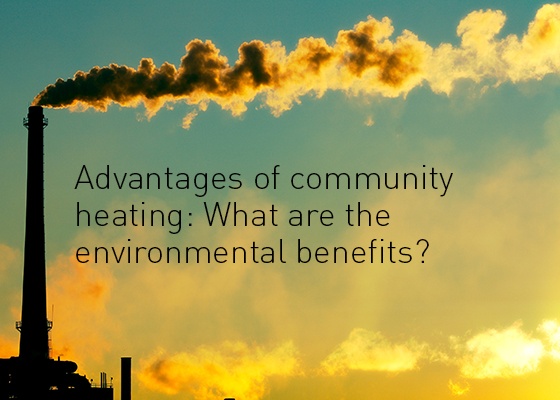To celebrate GreenGB week, we explain how adopting heat network for heat and hot water for your development can reap environmental rewards as well boosting financial and fuel-efficiency.
 Some 476,951 of the UK’s 27.1m households currently benefit from being part of a district or community heat scheme and the Government wants to see up to 11m connected by 2050. These homes are fed hot water from a central boiler plant and don’t need individual boilers.
Some 476,951 of the UK’s 27.1m households currently benefit from being part of a district or community heat scheme and the Government wants to see up to 11m connected by 2050. These homes are fed hot water from a central boiler plant and don’t need individual boilers.
So, community heating gives renters and owners an affordable, always-on source of heat. But it also provides a number of environmental boons that help everyone else, too.
Here are three big ones.
1. Simply more efficient
It’s just common sense that having one central heating source would be cost and energy-efficient and produce fewer carbon emissions that lead to climate change.
For a start, there is better control. A central boiler room is set up by expert installers, maintained by professional service engineers and the homes it serves are fitted with high-tech heating controls to provide all the required warmth.
Secondly, every boiler consumes energy that doesn’t result in useful heat – around flames, in the flue draft and elsewhere. Wastage can be much less in a central arrangement.
Thirdly, all boilers need regular gas checks and maintenance. Think of the carbon emitted by all those engineers driving around keeping individual boilers running properly.
That’s on top of carbon emitted when boilers are made and transported.
2. Connect for success
Around the UK, there are dozens of district heating networks for developers to hook into. These use excess released by many different facilities including factories, power stations, hospitals and energy-from-waste plants.
The green advantages of these systems are three-fold:
Firstly, they improve upon the efficiencies of scale mentioned earlier. And if a block of flats with a community heating boiler room was connected to a wider network, managers could remove the kit and tap into the more efficient system.
Secondly, the networks can use that would otherwise go to waste. For example many big power stations currently pipe hot water used for cooling into the ocean.
Thirdly, because heat loads at work and in the home peak at different times, there is a better balance; less heat is wasted when it would otherwise go unused.
3. Better fuel options
Gas emits 227kg of carbon per MWh generated. But wood only emits between 5 to 22kg/MWh depending on the type of wood and how it is used.
Biomass is only a viable option on larger networks since it requires delivery and storage on a large scale. The Government’s Renewable Heat Incentive (RHI) pays generators for heat to overcome the higher costs of boilers and fuel.
Other, more carbon-efficient solutions community networks can take advantage of include biogas and water air or ground-source heat pumps.
Takeaways:
- Heat networks are more environmentally friendly because they work at scale, can be more efficient and can tap into larger district networks – saving fuel and carbon.
- Creating heat at scale in a central facility is more efficient due to less user interaction, can make use of renewable sources and requires less carbon-heavy maintenance and involves less manufacture.
- Some sites might be suitable for biomass, which is a relatively low-carbon fuel.
- Community heat networks can tap into nearby larger district heating networks, further boosting their efficiency.
- The government is keen to see the growth of community heating due to European targets and pays people to generate renewable heat.
Find out how to bring the benefits of community heating schemes to the UK. Get your free eGuide now: The ultimate guide to community heating




